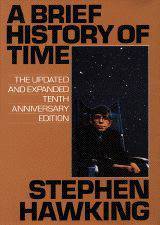

| Click on a book's image or title to order from Amazon.com |

A Brief History of Time
by Stephen W. HawkingBantam Books, © 1988, 182 pp, ISBN #0-553-05340-X
Someone recently remarked in my presence that A Brief History of Time is a book that many people have on their shelves, but few have read. I quickly decided that this would never do, and sat down to read it.
Hawking, perhaps the world's foremost physicist, is a crisp, clear and often witty writer. In his acknowledgments he says that he'd been told that for each equation he included in a popular physics book he'd alienate half his potential readership. he therefore omitted all equations except for E=mc2. As a result, the text is sometimes a little light on concrete content, but Hawking generally does a good job of describing his subject in layman's terms.
A Brief History of Time is exactly that, in the manner that theoretical physicists view time. The text uses as its jumping-off point Einstein's formulations of the special and general theories of relativity, and its counterpart theory of quantum mechanics. Hawking then takes the reader through the development of modern physics and our view of time and the universe: How it began, how it might end (assuming it does; Hawking says it's possible that there will be no "Big Crunch" corresponding to the Big Bang, but we don't have the evidence to tell one way or the other), and some of the phenomena - most notably black holes - which arise from these theories.
Anyone with a solid college physics and chemistry background will probably be familiar with about 40% of the concepts in the book. Readers of hard science fiction will probably have a passing knowledge of another 10-20% of them. Unfortunately, it's the remaining 40% which Hawking doesn't do such a great job of describing for people outside his field. He generally is very solid in describing conclusions which have been fairly definitely reached and/or verified (although his description of the curvature of space-time is wanting), but when he gets into areas of current research in the last few chapters, you get the impression that he's waving his hands quite a bit. For instance, in discussing why the universe has worked out the way it has rather than some other way, he mentions that it would be difficult for life to have developed if there were only two spatial dimensions. My immediate reaction to this was, "Get this man copies of some of the intellectual theorizing about A.K. Dewdney's Astria!"
Hawking also says he believes there is some reason to think we have nearly unraveled all the mysteries of physics, which is at best disheartening for people who dream of faster-than-light travel, and at worst a statement which elicits feelings of "I've heard that before."
A Brief History of Time is informative, though less so than it might have been. I wonder how people with no physics background find it?
hits since 13 August 2000.